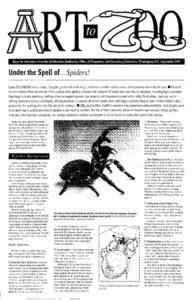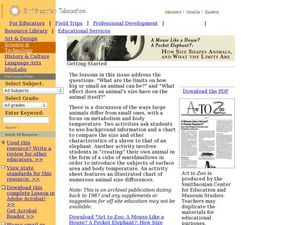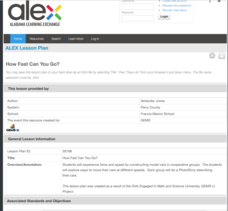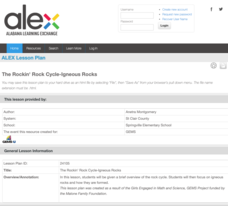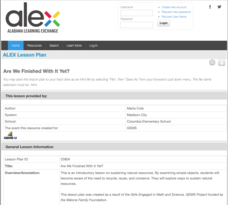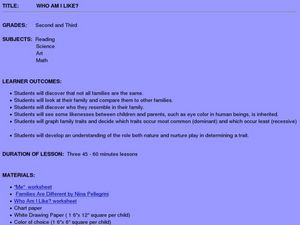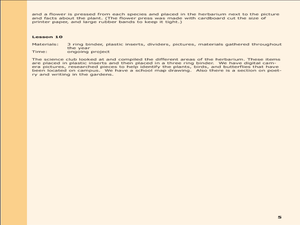Curated OER
The Perfect City
Students analyze group influences on people, events and culture. They design their own perfect society and report it to the class.
Curated OER
You Too Can Haiku
Students conduct Internet research and explain the history of Haiku. After listening and reading various examples of Haiku, students use their own vocabulary and practice their math skills to determine the correct number of syllables...
Curated OER
Making Learning a Game
A game lesson can be a way to explore a variety of concepts with your students.
Curated OER
The Westward Movement
Students study the westward movement through examining stamps. For this westward movement lesson plan, students draw conclusions, determine cause and effect relationships and examine the westward movement of the United States by...
Alabama Learning Exchange
We Can Dig It!
Third graders understand the process by which fossils and rocks are excavated. For this fossil and rock lesson, 3rd graders explore the job of the paleontologist in a podcast.
Curated OER
Under the Spell of Spiders
Young scholars examine spiders. In these spider lessons, students will view spider images and live spiders to determine physical characteristics, habits, and habitats. Young scholars will examine fantasy and folklore about spiders to...
Curated OER
How Size Shapes Animals
Learners investigate how size affects large and small animals differently. In this animal lesson plan, students determine how size affects different animals by constructing their own animal out of marshmallows. Once learners create...
Curated OER
Recycling & Our Environment
Young scholars present information about recycling to other students. In this environmental protection instructional activity, young scholars create a puppet show or commercial about the importance of recycling for other students to view.
Alabama Learning Exchange
How Fast Can You Go?
Learners investigate force and speed. In this physics instructional activity, students construct model cars in small groups and perform experiments to identify what factors influence speed and force.
Alabama Learning Exchange
The Moon
Young scholars explore the phases of the moon. In this solar system lesson, students listen to several books about the moon including The Moon Book by Gail Gibbons. Young scholars complete a KWL activity concerning the phases of the moon...
Alabama Learning Exchange
The Rockin' Rock Cycle: Metamorphic Rocks
Learners study the formation of metamorphic rock. In this metamorphic rock lesson, students examine how metamorphic rock forms as part of the rock cycle. They review the rock cycle using chocolate chips, conduct Internet research, and...
Alabama Learning Exchange
The Rockin' Rock Cycle- Igneous Rock
Fifth graders recall prior knowledge about rocks. In this igneous rock lesson, learners work in cooperative groups to perform experiments to classify the properties of igneous rock. They write a detailed paragraph and illustrate the rock...
Alabama Learning Exchange
Making and Observing Life in a Terrarium
Young scholars understand the parts of the terrarium and why they are important in establishing an ecosystem. In this ecosystem lesson, students recall background information on aquariums, terrariums and the water cycle. Young scholars...
Alabama Learning Exchange
Are We Finished with It Yet?
Learners recognize the importance of natural resources and that we need to conserve, reuse and recycle them. In this conserving natural resources lesson, students are given one object and must create something with it. Young scholars...
Curated OER
Where are all the Animals?
Students view animals that camouflage at the Shedd aquarium website. In this camouflage lesson, students recognize that there are different types of camouflage, cryptic coloring, counter-shading, warning coloration and mimicry. Students...
Curated OER
Let's Make a Meal: A Study of Oats
Students investigate the history and health benefits of oats. In this food history and nutrition lesson, students describe the origin of oats in America, define nutrition related vocabulary, and read and follow recipes for making...
Curated OER
Who Am I Like?
Students examine family structures. In this family structure lesson, students discover things about their own families and those of their classmates. They make a chart as they discuss nature versus nurture, complete a worksheet about who...
Curated OER
Nature Oriented Kindness Projects
Students complete various nature activities where they work together to create a butterfly garden, plant flowers, learn about nature survival, and more. In this nature lesson plan, students work together in groups and display kindness...
Curated OER
How Plants Help Us Breathe
Third graders discuss how humans breathe and how plants help us to stay alive. In groups, they identify and label the different parts of plants and describe their functions. They compare and contrast the ways plants and animals breathe...
Curated OER
A House for Me- Ocean Environments
Students explore ocean environments. In this ocean environment lesson, students identify the things ocean animals need for survival. Students use KWL charts and search the Internet collecting information about ocean habitats....
Curated OER
Projects For USA Units
Students study different regions of the United states through interdisciplinary activities. This lesson presents very creative, artistic ways for students to explore the variety of regions found in the United States.
Curated OER
Rosh Hashanah and Yom Kippur
Students research the importance of Rosh Hashanah and Yom Kippur. In this holiday lesson, students are introduced to the meaning behind these Jewish holidays and identify geography of Israel.
Curated OER
Spore Drop
Pupils observe the pattern of the inside of a mushroom and write down what they see. In this mushroom lesson plan, students cut a mushroom at the top and draw what they see in the spore of the mushroom.
Curated OER
Animal Shelters - Sharing Our Knowledge
Young scholars arrange a service project for a local animal shelter. For this animal shelter lesson, students collect items to be given to a local shelter. They learn how to estimate the monetary value of the donated items. They can do...





